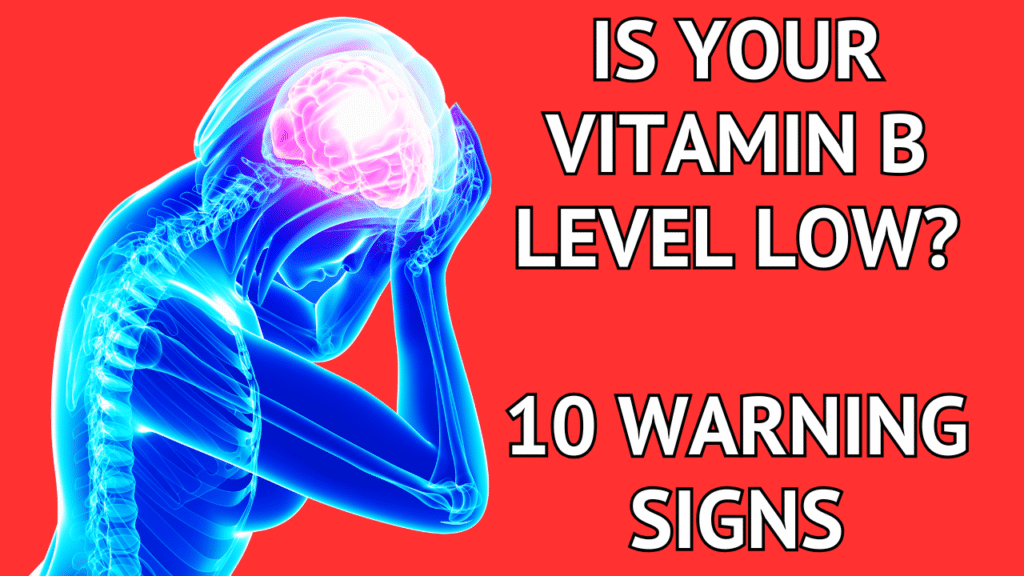
Vitamin B deficiency can silently impact your health, causing symptoms that range from mild fatigue to severe neurological issues. The B vitamins—B1 (thiamine), B2 (riboflavin), B3 (niacin), B5 (pantothenic acid), B6 (pyridoxine), B7ទ), B9 (folate), and B12 (cobalamin)—are critical for energy production, brain function, metabolism, and more. Since these water-soluble vitamins aren’t stored in the body, a consistent intake through diet or supplements is essential. In this article, we’ll uncover 10 warning signs of low Vitamin B levels, explore their causes, and share actionable steps to correct deficiencies, optimized with SEO keywords for maximum reach.
B vitamins are powerhouse nutrients that support:
- Converting food into energy
- Maintaining brain function and mental clarity
- Promoting healthy skin, hair, and eyes
- Supporting nerve function
- Producing red blood cells to prevent anemia
- Ensuring healthy fetal development during pregnancy
A deficiency in any of these vitamins can lead to significant health problems. Let’s dive into the 10 warning signs of dangerously low Vitamin B levels and how to address them.
10 Warning Signs of Vitamin B Deficiency
Recognizing the symptoms of Vitamin B deficiency is key to early intervention. Here are the top signs to watch for:
1. Persistent Fatigue and Weakness
Feeling constantly tired despite adequate rest? Low Vitamin B levels, especially B12, can impair energy production, leading to chronic fatigue and weakness. This is one of the most common signs of deficiency.
2. Cognitive Issues and Memory Loss
Vitamin B12 deficiency can cause memory loss, confusion, and even dementia in severe cases. B vitamins are essential for brain health, and low levels can impair cognitive function, leading to brain fog.
3. Anemia Symptoms
Deficiencies in Vitamin B12 or folate (B9) can cause megaloblastic anemia, where red blood cells are abnormally large and ineffective. Symptoms include fatigue, pale skin, shortness of breath, and dizziness.
4. Mood Changes and Depression
Low levels of Vitamin B6 or B12 can disrupt the production of mood-regulating neurotransmitters like serotonin and dopamine, leading to depression, anxiety, mood swings, or irritability.
5. Tingling Sensations and Nerve Damage
Vitamin B12 deficiency can cause nerve damage, resulting in tingling, numbness, or a “pins and needles” sensation in the hands and feet. Severe cases may lead to balance issues or difficulty walking.
6. Weakened Immune System
A lack of Vitamin B6 can weaken your immune system, making you more prone to infections. B vitamins support antibody and white blood cell production, crucial for fighting illness.
7. Skin Rashes and Dermatitis
Deficiencies in Vitamin B2, B3, or B6 can cause skin rashes, cracked lips, or scaly patches. These skin issues often appear on the face, hands, or other areas.
8. Hair Loss
Biotin (B7) deficiency is linked to hair loss and thinning. Biotin is vital for keratin production, which supports healthy hair, skin, and nails. Low levels can cause brittle hair or alopecia.
9. Digestive Problems
Low levels of Vitamin B1, B2, B3, or B6 can disrupt the digestive system, leading to nausea, abdominal cramps, constipation, or diarrhea.
10. Vision Problems
A Vitamin B2 (riboflavin) deficiency can cause vision issues, such as light sensitivity, blurred vision, or itchy eyes. Severe deficiencies may contribute to cataracts or other eye conditions.
Causes of Vitamin B Deficiency
Several factors can lead to low Vitamin B levels:
- Poor Diet: Diets low in B-vitamin-rich foods like leafy greens, meat, eggs, dairy, nuts, and whole grains can cause deficiencies.
- Alcoholism: Excessive alcohol consumption impairs the absorption of Vitamin B1 and B12.
- Malabsorption Disorders: Conditions like Crohn’s disease, celiac disease, or gastric bypass surgery can hinder B vitamin absorption.
- Aging: Older adults often have reduced stomach acid, impairing Vitamin B12 absorption.
- Pregnancy: Increased folate needs during pregnancy can lead to deficiencies if not addressed.
Diagnosing and Treating Vitamin B Deficiency
If you suspect a Vitamin B deficiency, consult a healthcare professional. A blood test can confirm low levels and guide treatment. Here’s how to address it:
1. Dietary Changes
Incorporate B-vitamin-rich foods to boost levels naturally:
- B12: Meat, fish, eggs, dairy
- Folate (B9): Leafy greens, beans, lentils
- Biotin (B7): Eggs, nuts, seeds
- B6: Poultry, fish, bananas
- B1, B2, B3: Whole grains, meat, dairy
2. Supplements
For severe deficiencies, B-complex supplements or high-dose Vitamin B12 supplements may be recommended to restore levels quickly.
3. Injections
In cases of severe Vitamin B12 deficiency, injections may be necessary to bypass absorption issues in the gut.
Take Action for Your Health
Vitamin B deficiency can lead to serious health issues, but early recognition and treatment can make all the difference. If you’re experiencing fatigue, memory problems, mood changes, or other warning signs, consult a healthcare provider to check your B vitamin levels. By addressing deficiencies through diet, supplements, or injections, you can restore your energy, mental clarity, and overall well-being.
Have you noticed any of these Vitamin B deficiency symptoms? Share your thoughts, and let’s discuss how to stay healthy!
